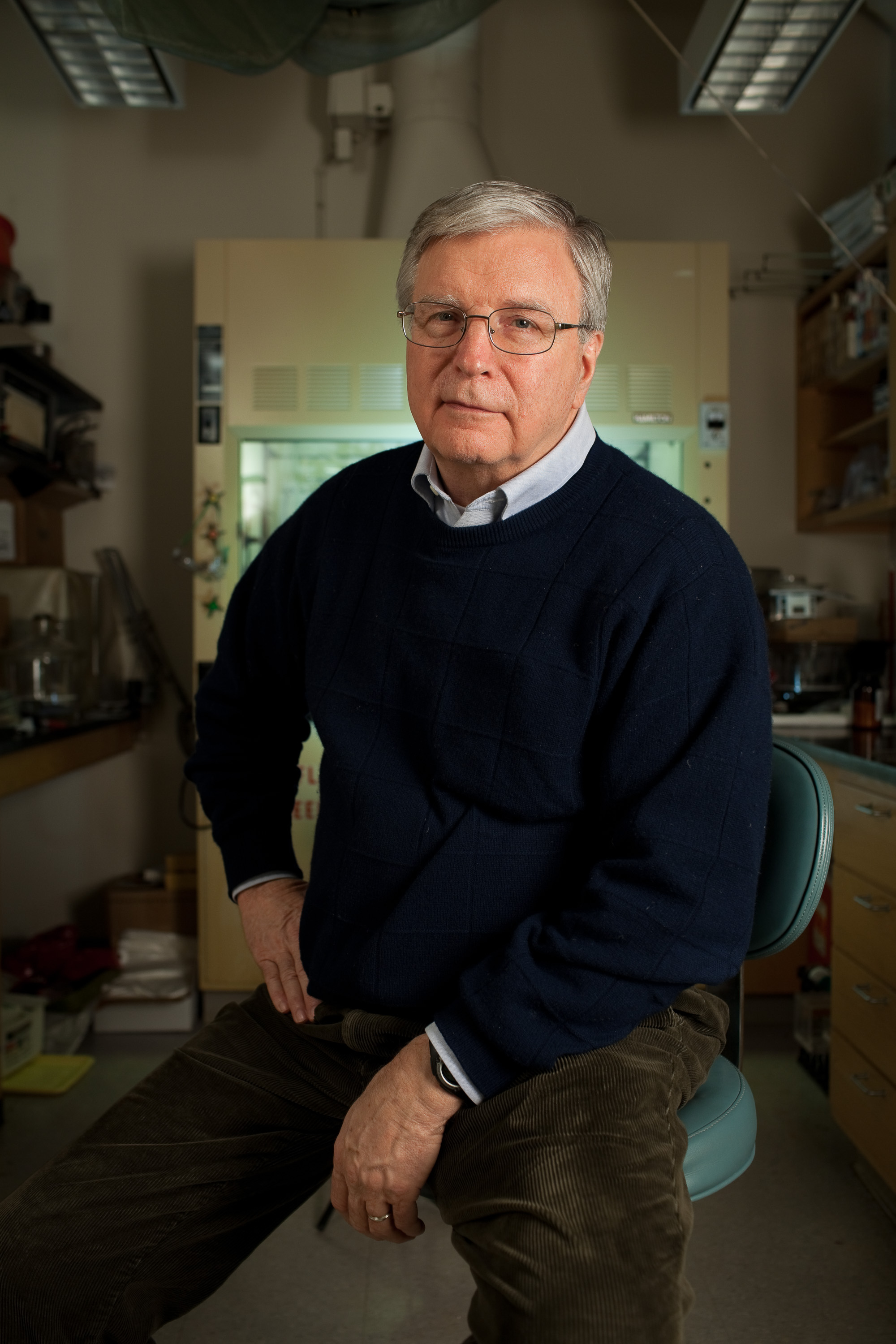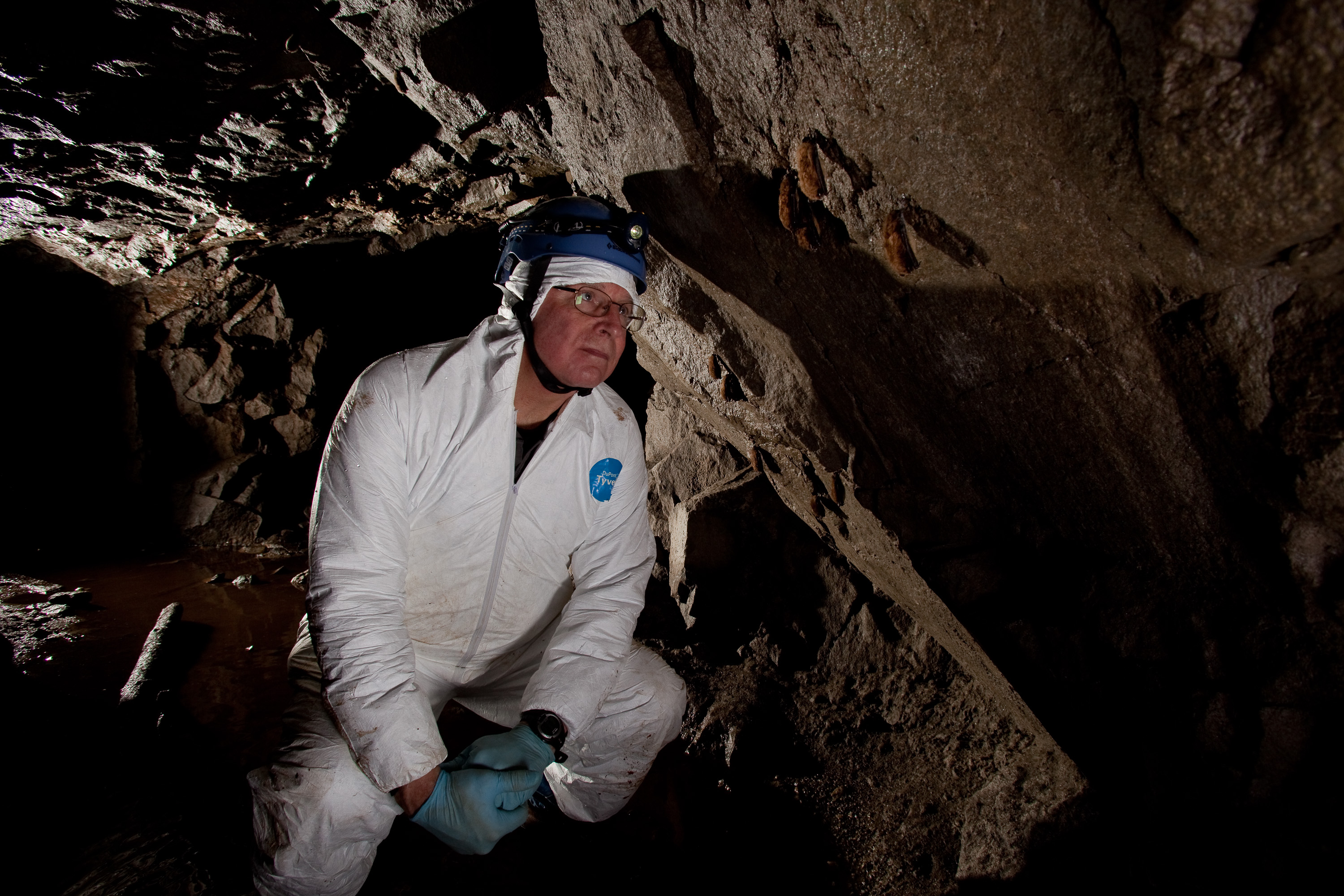Richard Primack and Alum Caitlin McDonough MacKenzie Receive ESA’s George Mercer Award
Dr. Richard Primack and his former PhD student, Dr. Caitlin McDonough MacKenzie (GRS '17), received this year's Ecological Society of America's George Mercer Award for their paper “Phenological mismatch with trees reduces wildflower carbon budgets.” The Mercer Award recognizes an outstanding, recently-published, ecological research paper by young scientists.
Congratulations, Richard and Caitlin!
2020 Biology Department Undergraduate Research Award Winners

Congratulations to the recipients of the 2020 Biology Department Undergraduate Research Award. The Biology Research and Honors Committee gives this annual award to outstanding seniors of any major who are performing research in Biology Department labs. This year's winners were Rose Zhao (CAS, BMB), Jasmine Clevenger (ENG, BME), and Madison Pacaro (CAS, Biology).
Rose conducted research with Dr. Trevor Siggers on characterizing cell-specific transcriptional recruitomes using a high-throughput microarray platform. Jasmine performed research with Dr. Tim Otchy on a miniscope for multiplexed single-photon imaging of spectrally distinct fluorescent reporters in unrestrained small animals. Madison performed research with Dr. Pete Buston studying nocturnal parental care and the role of parents in hatching in the clown anemonefish.
Rose, Jasmine and Madison will present their research at a Department-wide seminar on April 27. Please join us in celebrating these students’ accomplishments and their hard work.
Remembering Professor Emeritus Thomas H. Kunz

Professor Kunz was also a leader, serving as Biology department chair from 1985-1990, co-founding the Tiputini Biodiversity Station in Ecuador in the 1990’s, and founding and leading our Center for Ecology and Conservation Biology for many years. He was named a William Fairfield Warren Distinguished Professor in 2011, BU’s highest faculty honor.
At the age of 73 in 2011, Tom was still running laps around his more junior colleagues and was perhaps at his most productive, with seven PhD students and current grants from six different agencies. While he likely would have continued his research for years to come, his academic career was cut short by a tragic accident in 2011; his determination and positive attitude saw him through a long, tough recovery and allowed him to enjoy his friends and family, including five grandchildren, until his passing on April 13, 2020. Professor Kunz was a good friend and important mentor to many in the Biology Department and beyond, and he will be sorely missed.
Information about a memorial will be shared when available. If you would like to make a donation in Professor Kunz’ memory, please consider the Thomas H. Kunz Fund.

Biology Graduate Students and Alumni Awarded NSF Graduate Research Fellowships
|
|
|
|
|
|
The awardees and honorable mentions for the 2020 NSF Graduate Research Fellowship Program (GRFP) competition were recently posted and several Biology & MCBB students were recognized. MCBB Ph.D. student Marisol Dothard, Biology Ph.D. student Zoey Werbin in the Bhatnagar lab, and M.S. Biology student Caroline Fleming in the Rotjan lab were all awarded with a 3-year graduate research fellowship as well as incoming Ph.D. student Corinne Vietorisz joining the Bhatnagar lab in Fall 2020. Jonathan Gewirtzman, the Lab Manager & Senior Research Technician for the Templer lab was also awarded the NSF GRFP.
Several students also received honorable mention: MCBB Ph.D student Abigail Descoteaux in the Bradham lab, Biology Ph.D. student Melissa Inge (also an alum of the Biology Department, CMG, '19) and incoming Biology Ph.D. students Jacob Jaskiel joining the Rotjan lab and Maria Ingersoll.
The NSF GRFP was also awarded to undergraduate Biology and BMB alumni currently pursuing their graduate degrees. The awardees were Billie Goolsby (BMB, ’19) now at Stanford University, Amber Wendler (Biology, ‘18) now at Virginia Polytechnic Institute, and Caylon Yates (BMB ‘15) now at Pennsylvania State University. There were several alumni that received honorable mentions as well, including Melissa Inge (CMG, ’19) noted above, Halina Malinowski (ECB, ‘16), Chris Petty (BA in BMB and MA in Biotechnology, ’19) now studying at Harvard University, and Rieka Yu (SBB, ’18) now studying at University of Missouri.
Congratulations to the awardees and honorable mentions on your hard work and this well-deserved honor.
Announcing the Dr. Marion R. Kramer Scholarship Winners
The Department of Biology is excited to announce the three recipients of this year's Dr. Marion R. Kramer Scholarship: Tina Barbasch of the Buston Lab, Shawna Henry of the Ho Lab, and Diane Lebo of the McCall Lab.
 Tina's research uses the clown anemonefish (Amphiprion percula) as a study system to answer broad questions in the field of animal behavior. Her dissertation focuses on understanding the environmental and social factors that influence individual variation in parenting strategies. She combines theoretical and empirical methods to study how and why parents provide care when it is costly. First, she conducted a 12 month laboratory experiment characterizing plasticity and personality in parental care. Next, to determine the consequences of this plasticity Tina led a field expedition to Papua New Guinea and tested how variation in environmental quality influences plasticity in reproduction and parental care. Expanding on this work, she asked how social interactions influence plastic behavioral strategies. Tina developed a game theory model of how power and punishment influence negotiations between parents over parental care, done in collaboration with Dr. Suzanne Alonzo at the University of California Santa Cruz. She then conducted an experimental test of this model in the field and she is currently writing up the results, which found support for her model. Together, the results of her research extend our understanding of how and why parents provide costly parental care and create a framework for studying parental care in other systems.
Tina's research uses the clown anemonefish (Amphiprion percula) as a study system to answer broad questions in the field of animal behavior. Her dissertation focuses on understanding the environmental and social factors that influence individual variation in parenting strategies. She combines theoretical and empirical methods to study how and why parents provide care when it is costly. First, she conducted a 12 month laboratory experiment characterizing plasticity and personality in parental care. Next, to determine the consequences of this plasticity Tina led a field expedition to Papua New Guinea and tested how variation in environmental quality influences plasticity in reproduction and parental care. Expanding on this work, she asked how social interactions influence plastic behavioral strategies. Tina developed a game theory model of how power and punishment influence negotiations between parents over parental care, done in collaboration with Dr. Suzanne Alonzo at the University of California Santa Cruz. She then conducted an experimental test of this model in the field and she is currently writing up the results, which found support for her model. Together, the results of her research extend our understanding of how and why parents provide costly parental care and create a framework for studying parental care in other systems.
 Shawna studies how preventing the interaction between Mint1, a neuronal adaptor protein, and amyloid precursor protein (APP) can be a potential therapeutic target to decrease Aβ production associated with Alzheimer’s disease (AD). Her work employs both a non-binding Mint1 mutant as well as a competitive APP mimetic peptide in vitro to prevent Mint1-APP association and decrease total Aβ production. Future studies will move this peptide in vivo to ascertain if the APP mimetic peptide strategy can decrease Aβ accumulation in an AD mouse model.
Shawna studies how preventing the interaction between Mint1, a neuronal adaptor protein, and amyloid precursor protein (APP) can be a potential therapeutic target to decrease Aβ production associated with Alzheimer’s disease (AD). Her work employs both a non-binding Mint1 mutant as well as a competitive APP mimetic peptide in vitro to prevent Mint1-APP association and decrease total Aβ production. Future studies will move this peptide in vivo to ascertain if the APP mimetic peptide strategy can decrease Aβ accumulation in an AD mouse model.
 Diane's research seeks to identify the network of processes that regulate cell corpse clearance by non-professional phagocytes using the Drosophila ovary. Her first project utilized high-throughput techniques to identify the translatome of the entire epithelial follicle cell layer as well as a subset of follicle cells specifically engaged in clearing dying cells. By comparing these two groups of genes, Diane hopes to identify processes that are differentially regulated during clearance. Her second project was performed as a collaboration with 8 other members of the McCall lab. Together, they screened hundreds of kinase lines during two different death modalities in an effort to identify phagocytic pathways used during apoptotic and non-apoptotic death. Together, the translatome and kinome give them a big-picture view of cell corpse clearance by non-professional phagocytes.
Diane's research seeks to identify the network of processes that regulate cell corpse clearance by non-professional phagocytes using the Drosophila ovary. Her first project utilized high-throughput techniques to identify the translatome of the entire epithelial follicle cell layer as well as a subset of follicle cells specifically engaged in clearing dying cells. By comparing these two groups of genes, Diane hopes to identify processes that are differentially regulated during clearance. Her second project was performed as a collaboration with 8 other members of the McCall lab. Together, they screened hundreds of kinase lines during two different death modalities in an effort to identify phagocytic pathways used during apoptotic and non-apoptotic death. Together, the translatome and kinome give them a big-picture view of cell corpse clearance by non-professional phagocytes.
This award provides support for high-achieving female students majoring in Biology. The award was established in 2001 in honor of Dr. Marion Kramer who earned her Bachelor’s degree in Biology from Boston University in 1963 and went on to a long and satisfying career in biology and medicine.
The Department of Biology gives this award to graduate students in the spring, and to undergraduate students in the fall. Read about our fall 2019 undergraduate recipients here.
Congratulations, Tina, Shawna, and Diane!
Hannah Aichelman Receives Dana Wright Fellowship

Hannah Aichelman of the Davies Lab is this year's recipient of the Dana Wright Fellowship. Hannah's research interests are broadly focused on understanding resilience and responses to rapid climate change of the coral animal and its symbiotic algae.
Her current work uses physiological and molecular tools to answer these questions in both tropical and temperate marine ecosystems. In the tropics, she is working with corals from the Mesoamerican Barrier Reef System to consider species and reef zone-specific responses through time for corals under temperature and ocean acidification stress. Further north in temperate waters, she is utilizing the facultatively symbiotic coral Oculina arbuscula to consider how the coral animal and its symbiont independently respond to temperature extremes both while in symbiosis and when the symbiont is outside of the coral. Better understanding stress responses of temperate corals, like O. arbuscula, will hopefully provide key insights into understanding how tropical coral symbioses will be affected by climate change.
This fellowship was established in memory of Dana Wright (CAS ’00), an alum of the BU Marine Program. After completing her studies, Wright went on to work in research in right whale acoustics at the Woods Hole Oceanographic Institution on Cape Cod.
Congratulations, Hannah!
Isabella Muratore Receives Brenton R. Lutz Award

Isabella Muratore of the Traniello and Mullen Labs is the recipient of this year's Brenton R. Lutz Award. Isabella's research focuses on the fungus-growing ant Atta cephalotes, which exhibits an extraordinary worker polymorphism of body size-related task specialists, or subcastes. Social role variation that underpins the agricultural habits of this species correlates with brain size and structure. To understand the relationship between brain differentiation and worker specialization, Isabella has identified genes differentially expressed among brains from A. cephalotes subcastes. She has also quantified task performance, correlating it with brain size and allometric variation among functionally specialized brain regions. Focusing on genes that she found were differentially expressed among A. cephalotes subcaste brains, she will look for signatures of positive selection and copy number variation and will compare them to orthologous sequences and regulatory regions of less socially complex relative species.
This award provides support for PhD candidates conducting research in neurobiology or neuroscience and have made significant contributions to their field. Brenton R. Lutz was the first person to receive an MD/PhD at Boston University, receiving his PhD in 1916. He later became a Professor and Chairman of BU’s Department of Biology. Dr. Lutz also gave the first University Lecture at BU on December 11, 1950 “The Living Blood Vessels.”
Congratulations, Isabella!
Margaret O’Connor Receives Charles Terner Award

Margaret O'Connor, MCBB PhD candidate of the Man Lab, is this year's recipient of the Charles Terner Award. Margaret is investigating the X-linked protein NEXMIF, which is associated with Autism Spectrum Disorder (ASD). She uses a transgenic mouse model to study the role NEXMIF plays in brain development, specifically neuronal growth and dendritic spine development. There are a number of human patients with NEXMIF dependent ASD. Her research currently focuses on the unique situation of female heterozygotes which mosaically express NEXMIF yet still develop ASD.
This award provides support for a CM or MCBB PhD candidate who has made significant contributions to their field. Charles Terner was a Professor of Biology at Boston University for over 20 years before he retired in 1985. Dr. Terner specialized in biochemistry and focused his research on the metabolic properties of male reproductive cells. The award was established in his memory after he passed away in 1998.
Congratulations, Margaret!
Robin Francis Receives Thomas H. Kunz Award

Robin Francis of the Buston Lab is this year's recipient of the Thomas H. Kunz Award. Robin has general interests in marine metapopulation ecology and conservation biology, and specific interests in plasticity of larval dispersal and its effects on population connectivity of reef fishes. The aim of her current research is to conduct an experimental investigation of plasticity of larval dispersal in response to parental environment in a marine fish. She will tackle this objective using a captive population of clownfish in a lab experiment as well as using a wild population in Papua New Guinea in a field experiment. Her goal is for results from these studies to deepen the understanding of the causes of variation in patterns of larval dispersal, which has important implications for conservation and fisheries management.
This award provides support for Ecology, Behavior & Evolution (EBE) PhD candidates who have completed the qualifying exam, with a preference for those conducting field research in the award year. The award was established in 2015 in recognition and appreciation of Professor Thomas H. Kunz’s mentorship. His current and former graduate students established this award to serve as a lasting legacy of Tom’s contributions at BU and beyond. Learn more about Dr. Kunz and how you can support this award.
Congratulations, Robin!
Professors Siggers and Emili Awarded NIH Grant
Biology Professors Trevor Siggers and Andrew Emili have been awarded a 5-year NIH R01 grant to study how changes in people’s DNA, called SNPs, affect Autoimmune Diseases. Their work will focus on elucidating how SNPs change the binding of gene regulatory complexes driving immune gene expression.



